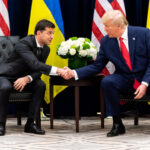KYIV, UKRAINE — Diplomatic circles are buzzing with controversy following allegations that Ukraine was deliberately excluded from high-level peace discussions in Riyadh between U.S. and Saudi officials regarding the ongoing Russia-Ukraine conflict.
The claims emerged after Ukrainian Foreign Minister Dmytro Kuleba told reporters that his government received no formal invitation to the Saudi-hosted summit, despite the talks directly addressing Ukraine’s future. “It is deeply concerning that discussions about Ukraine are happening without Ukraine,” Kuleba stated during a press conference in Kyiv yesterday.
Social media platforms have amplified these concerns, with hashtags like #UkraineDeservesSeat trending in multiple countries. Several prominent analysts and former diplomats have fueled speculation about backroom deals, suggesting the exclusion signals a potential shift in Western strategy.
The allegations gained further traction when an anonymous source, claiming to be a junior diplomat with knowledge of the proceedings, told European media outlets that the Riyadh talks included discussion of territorial compromises that Ukrainian leadership has consistently rejected.
The U.S. State Department quickly issued a statement calling the allegations “completely unfounded” and emphasizing that the Riyadh meetings were “preliminary discussions to establish a framework for future negotiations that would absolutely include Ukrainian representation.”
Saudi officials echoed this position, with Foreign Ministry spokesperson Waleed Al-Khereiji stating: “These were consultative talks aimed at creating conditions for comprehensive peace discussions where Ukraine would naturally be a central participant.”
Despite these denials, the controversy has sparked protests outside the U.S. Embassy in Kyiv, where hundreds gathered holding signs reading “Nothing About Ukraine Without Ukraine.”
Political analysts note that the incident highlights growing tensions about the direction of peace efforts as the conflict continues with no resolution in sight. Dr. Sarah Mendelson of the Carnegie Endowment commented, “Whether accurate or not, these perceptions of exclusion reflect deeper anxieties about Western commitment to Ukraine’s position as the conflict becomes increasingly protracted.”
Ukrainian President Volodymyr Zelensky is expected to address the controversy in a national address tomorrow, while diplomatic phones between Washington, Riyadh, and Kyiv remain active as officials attempt to clarify the situation and repair potential damage to the trilateral relationship.






